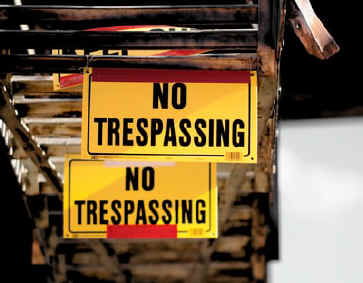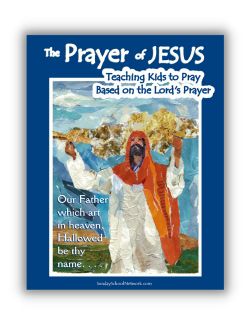No Trespassing
Debts, Debtors, Trespass, Trespasses | Matthew 6:9-15
Prop: a No Trespassing Sign.
Hold up the sign and ask, “Have you ever seen a No Trespassing sign in a neighbor’s yard or on
public property?
Why do you suppose people put up No Trespassing signs? (Receive answers.)
A No Trespassing sign is a notice to people that they don’t have permission to step onto
the property without permission from the owner. If people disregard the sign, oftentimes they could be
fined or experience bodily danger, because vicious dogs or armed guards could be protecting the property against trespassers. In other words, it is a warning to stay away, so they don’t get hurt.
The word trespass is also found in Scripture; it means “a false step or
sin.” In other words, it is disobedience against God's law, it is stepping
into the wrong place or activity that God warns us against.
When Jesus taught the disciples to pray, he told them to ask God for forgiveness and
to forgive others when they sin against them (Matthew 6:12).
The New Testament was originally written in Greek. The word for sin in this part
of Jesus' prayer is
opheilema, which in English means “a debt that is owed.” This is why
many English translations of the Bible say forgive us our debts, as we forgive our debtors.
Let’s say the Lord’s Prayer now. (Read Matthew
6:9-13.)
However, it's important to note that some Christians pray, “forgive us our trespasses, as we forgive those who trespass against us.” And there is good reason for
this too!
After Jesus taught the disciples to pray, he continued saying, “For if you forgive others their
trespasses, your heavenly Father will also forgive you, but if you do not forgive others their
trespasses, neither will your Father forgive your trespasses” (Matthew 6:14–15).
The word for trespass in Greek is paraptoma. Do you remember the
meaning of trespass? It means "a false step, a sin." And this is why some Bible translators use the words “trespass and trespasses” in the Lord’s Prayer,
instead of “debts and debtors.”
Both phrases, debts and trespass, are important and help us understand what Jesus wants us to know about sin
and forgiveness. First, we "owe a great debt" (opheilema) to God for our disobedience against him. The Bible says, “The wages of our sin is
death” (Romans 6:23a). Jesus came to
earth to die in our place, to take the punishment we deserve,
to pay the debt that we owe to God, so we can receive the free gift of eternal life (Romans
6:23b)! And because Jesus did this for us, he wants his children to forgive
others (our debtors).
Jesus then continued teaching the importance of not
"trespassing" (paraptoma) or “stepping into” the forbidden and dangerous territory of having an unforgiving
attitude.
It's as if God is holding up a big "No Trespassing" sign, (hold up the sign)
a warning, so we
don't get hurt! God has forgiven us, therefore, we must forgive
others.
Prayer
“Dear Jesus, thank you for forgiving the debts that I owe you, and the trespasses of
when I've gone the wrong way. Help me
to forgive others, just as you have forgiven me. In Jesus name, Amen.”
Have you used this Children's Sermon? Let me know how it went! Email: sarah@sundayschoolnetwork.com
Teach the Prayer of
Jesus lessons to children. And learn how to download our Lord's
Prayer poster, available in both versions--debts and trespass!

Copyright 2020 Sarah A. Keith
If you like this children's sermon, then you'll love It's in the Bag - 52 Bible Talks for Children's Ministry.
You can make a
difference!
Your purchases
and donations to the site help to distribute
our children's ministry resources to churches across the world.
Subscribe to our Newsletter - Learn More